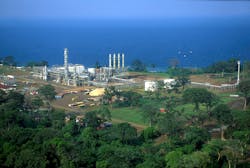Equatorial Guinea proposes Punta Europa modular refinery
Equatorial Guinea’s Ministry of Mines and Hydrocarbons (MMH) is ordering the dismantling of a methanol plant owned by Atlantic Methanol Production Co. LLC (AMPCO) at the Punta Europa gas complex on Bioko Island, calling instead for its conversion into a modular crude oil refinery.
The MMH already has commissioned a feasibility study to convert the Punta Europa methanol plant—a component of the larger Punta Europa gas processing facility—owned by Marathon Oil Co. 45% as well as partners Noble Energy Inc. 45% and Sociedad Nacional de Gas de GE SA 10%, the African Energy Chamber (AEC) said.
The proposed plant conversion comes amid the MMH’s discontent over declining gas production as well as Marathon Oil’s work program and budget when it comes to exploration and production on its current acreage in Equatorial Guinea, which do not reflect the anticipated level of investment and commitment for key assets such as Alba offshore field and the AMPCO methanol plant, AEC said.
“The Punta Europa complex is the crown jewel in Equatorial Guinea’s gas processing infrastructure and is central to our long-term plans for gas monetization. However, due to a lack of investment in the Alba field and the methanol plant, a modular refinery would be a more productive project for that space,” said H.E. Gabriel Mbaga Obiang Lima, minister of MMH.
Further details regarding the proposed modular refinery project, however, were not disclosed.
MMH said new investment is needed in the Punta Europa complex, a part of the country’s new gas megahub project that aims to provide additional gas supply to processing facilities both onshore and offshore Equatorial Guinea.
Currently, the AMPCO plant receives gas supplies from Marathon Oil’s Alba field, production from which is declining, according to MMH.
The first phase of the gas megahub project is to implement a new gas supply agreement signed between MMH and Noble Energy, operator of Aseng and Alen fields in Block I/O. Gas will be supplied to the Punta Europa gas complex, which includes the Malabo power station, AMPCO methanol plant, and EG LNG’s LNG plant. The agreement, combined with new subsea pipelines linking Aseng, Alen, and Alba fields, will replace some of the gas production lost as Alba field declines, MMH said.
Despite declining production form Alba field, however, Noble Energy, Kosmos Energy Ltd., and Trident Energy Management Ltd. have made major discoveries after an aggressive 2019 work program, according to a Dec. 16 release from AEC.
Noble Energy made a discovery in the offshore Block 1 in August, when the Aseng 6P well was drilled to a total depth of 4,417 m.
Kosmos Energy and Trident Energy struck oil in November, making a discovery when the S-5 well was drilled to a total depth of 4,400 m and encountered 39 m of net oil play in the Santonian reservoir, in the offshore Rio Muni basin.
Accelerated following acquisition of new 3D seismic data in 2018, Kosmos’s drilling of the S-5 well and subsequent discovery was the first well drilled in Kosmos’s infrastructure-led exploration in offshore Equatorial Guinea, according to MMH.
“New investment is what is needed to continue to drive Equatorial Guinea forward. We are very pleased to be working with companies like Noble Energy, Kosmos Energy, and Trident Energy, which remain committed to strong work programs and new opportunities for growth,” Lima said.
MMH expects a minimum direct investment of $1.4 billion—including a firm $1.2 billion as well as a contingent forecast of $273 million—for drilling of two wells and continuous development of six existing wells in Equatorial Guinea in 2020.
Gas megahub strategic partnership
Announcement of the proposed modular refinery follows MMH’s November entrance into a strategic partnership and cooperation agreement with Vitol Group on development of Equatorial Guinea’s planned Punta Europa gas megahub, which aims to develop several offshore gas hubs and monetize neighboring gas reserves, MMH said in a Nov. 26 release.
Specifically, the project seeks to establish a modern, flexible gas processing and export system that will service the needs of growing gas demands in the region and the global LNG market, enabling Equatorial Guinea to optimize the value of its gas production across LNG, LPG, condensate, and other products, as well as providing other regional producers with access to modern infrastructure and economies of scale, according to MMH.
“It was very important to partner with companies that share the vision of the gas megahub like Vitol,” Lima said. “We are now under the implementation phase and interested parties should be ready to invest or move aside.”
Russell Hardy, Vitol’s chief executive officer, said the company’s participation in the project confirms the critical role gas will play in the evolving energy mix, noting that Equatorial Guinea is well placed to become a key regional hub.
Located north of Bioko Island and close to countries such as Cameroon and Nigeria, the gas megahub project would enable a cross-border link with gas projects in those countries, opening the door to establish new hubs to service the region, MMH said.
The gas megahub also would reduce dependency on single upstream producers for industrial development and—combined with new subsea pipelines linking the country’s Aseng, Alen, and Alba fields—would allow gas to be redirected to maximize efficiencies by using Punta Europa-Alba-Alen infrastructure to connect to new gas discoveries, drive monetization of stranded gas, increase fuel exports, and boost revenues, the ministry said.
About the Author
Robert Brelsford
Downstream Editor
Robert Brelsford joined Oil & Gas Journal in October 2013 as downstream technology editor after 8 years as a crude oil price and news reporter on spot crude transactions at the US Gulf Coast, West Coast, Canadian, and Latin American markets. He holds a BA (2000) in English from Rice University and an MS (2003) in education and social policy from Northwestern University.

